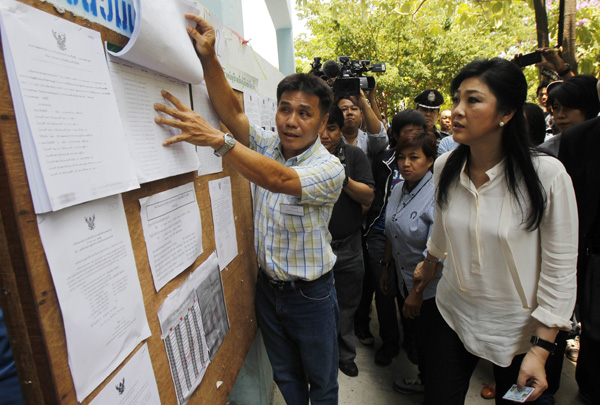Thais vote for Senate ahead of deadline for PM
By Agencies in Bangkok, Thailand (China Daily) Updated: 2014-03-31 07:31
 |
|
Thai Prime Minister Yingluck Shinawatra (R) checks a list of voters' names before voting at a polling station in Bangkok March 30, 2014. [Photo/Agencies] |
"However, most - around 90 percent - of appointed senators are anti-government, so if the Senate is asked to remove Yingluck, they're very close to the number of voices needed to do that."
 |
 |
Appointed senators are chosen by a committee that includes the heads of the National Anti-Corruption Commission, Constitutional Court, Election Commission, State Audit Commission and a representative of the Supreme Court.
Government supporters accuse the courts of bias and say many judges are aligned with the conservative establishment.
Thailand has been locked in a seemingly intractable political stalemate since Thaksin was ousted in a 2006 coup. The conflict broadly pits the Bangkok-based middle class and royalist establishment against the mostly poorer, rural supporters of the Shinawatras.
Protesters disrupted a Feb 2 general election which was nullified by a court on March 21, leaving Thailand in political limbo and Yingluck at the head of a caretaker government with limited powers.
Election officials have said it will take at least three months to organize a new vote, but that election going smoothly looks unlikely. Protesters have vowed to disrupt any general election held before their political changes are enacted.
Tens of thousands of anti-government protesters marched through the streets of Bangkok on Saturday to drum up support to oust Yingluck and rid the country of the influence of her brother, former prime minister Thaksin Shinawatra.
"If the opposition keeps boycotting elections, we'll never get anywhere and Thailand will be unable to solve its problems," Jarupong Ruangsuwan, leader of the ruling Puea Thai Party, told reporters after casting his vote for the upper house on Sunday.
Reuters - Xinhua










